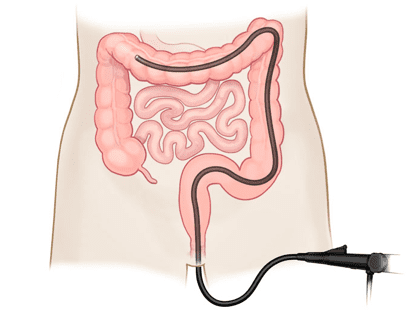Colonoscopy
What is colonoscopy?
 The colonoscopy is a medical examination in the gastroenterological field that allows an internal view of the patient's colon. It is a very important and requested test, used for the diagnosis of all colon diseases and problems such as:
The colonoscopy is a medical examination in the gastroenterological field that allows an internal view of the patient's colon. It is a very important and requested test, used for the diagnosis of all colon diseases and problems such as:
Diverticulosis and diverticulitis.
Colorectal Cancer.
Presence of intestinal polyps.
Inflammations in general.
Ulcers.
As often as necessary or appropriate to test
In the absence of diagnostic suspicion of specific pathologies, the advisability of performing a colonoscopy is generally linked to certain risk factors. The likelihood of developing colorectal cancer, for example, increases in people over 50. This is why certain prevention programs have been set up for the population, which are structured by screening. These investigations aim to detect, with different methods, the presence of occult blood in the faeces: a potential first sign of an increased risk of colon cancer. If there is no occult blood in the stool, it is advisable to repeat the test once a year; while if the presence of occult blood is found, an endoscopic examination is generally prescribed: precisely, Colonoscopy.
Is colonoscopy painful?
Colonoscopy is considered a boring and potentially painful examination. The pain is generated by the endoscopic probe which, to reach the last portion of the colon, requires a manual push. This push will cause real impacts against the walls of the lumen of the colon, thus generating pain.For this reason, almost all colonoscopies today are performed with the use of sedation.
How long does a colonoscopy take?
The colonoscopy has an average duration ranging from a minimum of 15 minutes to a maximum of 25 minutes. Execution time may change depending on the following variables:
Need to remove polyps (polypectomy).
Need to take samples, called biopsies.
Good visibility thanks to correct preparation by the patient.
Anatomical conformation of the colon.
Presence of restrictions also called strictures.
Risks
Like any medical examination and in particular endoscopy, colonoscopy is not a risk-free examination.However, the possibility of incurring any of the risks is close to zero. Colonoscopy can therefore be considered a safe test.
Risk of intestinal perforation: the reasons can be many, for example perforation may be caused by excessive pushing of the operator on the instrument, or improper operating procedure.
Risk of bacterial contamination: as is known in the traditional technique, the colonoscope is sterilized after each examination. Improper sterilization could increase this risk.
Risk of bleeding: in special situations, or when the patient has problems linked to blood coagulation, it can be particularly risky during colonoscopy to perform surgical procedures such as the removal of a polyp.
Colonoscopy with biopsy and/or polypectomy
The polypectomy is a surgical procedure which, through the working channel of the colonoscope, allows the ' removal of polyps inside the colon.It is an overall safe procedure, also thanks to the possibility of using specific clips that will allow the coagulation of the wound generated by the polypectomy.However, if there are any suspicious masses, small portions called biopsies may be taken which will then be sent to a specialized laboratory for the usual tests.